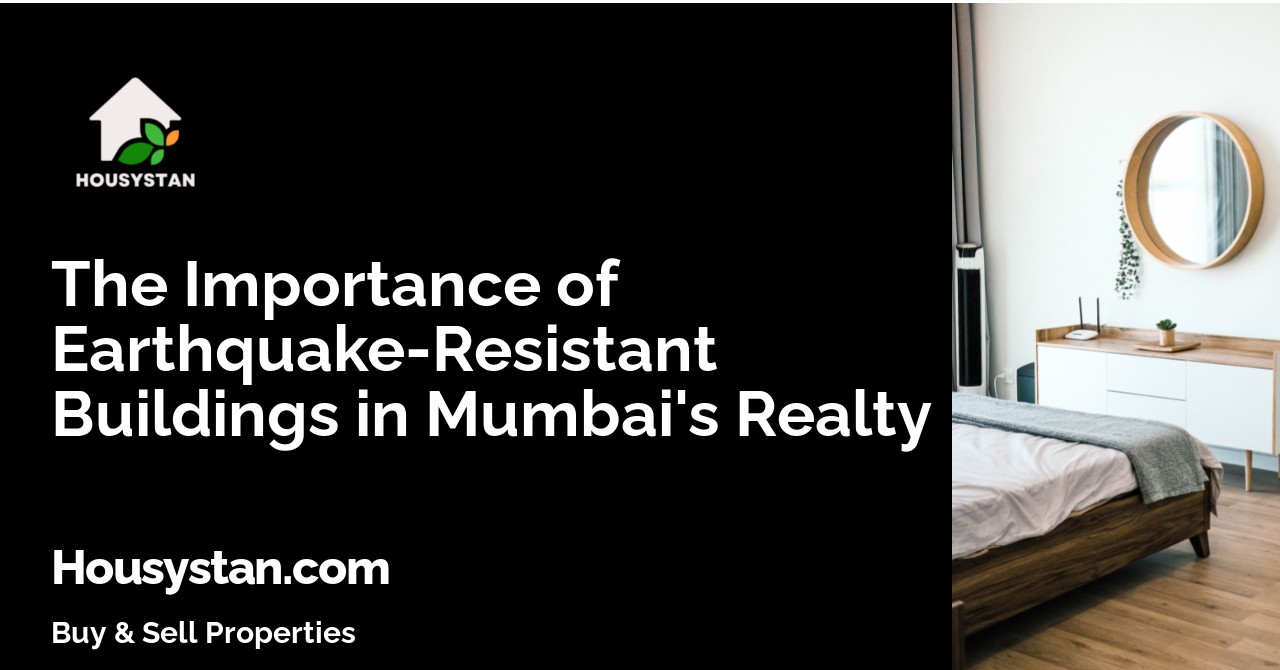The Importance of Earthquake-Resistant Buildings in Mumbai's Realty
Read latest blogs and articles from Housystan

The Information mentioned here was last updated on:
29/1/2026The Importance of Earthquake-Resistant Buildings in Mumbai's Realty
Mumbai, a bustling metropolis and the heart of India's economic activities, is home to millions of people living in diverse architectural structures. The city’s skyline is dotted with high-rises, slums, colonial-era buildings, and modern skyscrapers. However, the rapid urbanization and population density bring to light a critical concern—safety in the face of natural disasters, particularly earthquakes.
Why Earthquake Safety Matters in Mumbai
- Verified Tenants/Buyers
- Unlimited Property Listing
- Zero subscription/charges fee
Mumbai falls under Seismic Zone III, according to the Bureau of Indian Standards, which categorizes it as a moderate risk zone for earthquakes. Although the city historically experiences low to moderate seismic activity, the potential for more severe events cannot be overlooked. This precarious position underscores why the importance of earthquake-resistant buildings in Mumbai's realty sector is a necessity rather than a choice.
Key Concerns:
- Structural Vulnerability: Many buildings, especially those constructed decades ago, may not meet current safety standards.
- High Population Density: The sheer number of people living and working in Mumbai heightens the stakes of potential seismic events.
- Economic Risk: Mumbai is an economic powerhouse, and any major disruption could have far-reaching financial consequences.
What Makes a Building Earthquake-Resistant?
Designing earthquake-resistant buildings involves strategic planning and construction techniques that mitigate damage during seismic activities. Here are some core principles:
- Flexible Structural Design: Structures designed to sway can absorb and dissipate energy during ground movements.
- Shear Walls and Cross Bracing: These elements help reinforce buildings to withstand horizontal forces.
- Base Isolation: Incorporating flexible bearings at a building's foundation can minimize the transfer of seismic forces.
- Lightweight Materials: Using materials that are strong yet light helps reduce the overall load and stress on structures.
Current Scenario in Mumbai Realty
New Construction Projects
In recent years, the real estate market in Mumbai has seen an increased focus on developing earthquake-resistant structures. This shift is partly driven by stricter regulations and a growing awareness of the risks associated with seismic activities.
- Developers and architects are working hand-in-hand to integrate advanced construction practices.
- Many new high-rise buildings incorporate the latest engineering techniques to enhance safety and durability.
Existing Structures
Retrofitting older buildings is equally crucial. Many structures in Mumbai predate contemporary earthquake-resilience standards. Upgrading these buildings involves:
1. Assessing Structural Integrity: Conducting comprehensive audits to identify vulnerabilities.
2. Reinforcing Foundations and Frames: Strengthening the building's core elements.
3. Upgrading Materials: Using modern materials that offer better resilience against seismic forces.
Benefits of Earthquake-Resistant Buildings
Investing in earthquake-resistant structures brings numerous advantages beyond just safety. Here are some key benefits:
- Enhanced Property Value: Properties with advanced safety features often see increased market value.
- Insurance Benefits: Buildings designed to withstand earthquakes are typically cheaper to insure.
- Occupant Safety: The most vital benefit is protecting lives during seismic activities.
Government Regulations and Policies
The role of government regulations cannot be overstated in promoting earthquake-resistant construction. In India, building codes require adherence to safety standards aimed at minimizing risk. Key regulations in Mumbai include:
- National Building Code of India (NBC): Provides comprehensive guidelines for earthquake-resistant design.
- Municipal Regulations: Local bodies enforce building bylaws that incorporate NBC standards and others specific to seismic activity.
Challenges in Implementing Earthquake-Resistant Practices
While the benefits are clear, several challenges hinder the widespread adoption of earthquake-resistant designs in Mumbai:
- Financial Constraints: Implementing advanced construction practices can be costly.
- Lack of Awareness: Many property developers and buyers lack awareness about the importance of earthquake-resistant features.
- Regulatory Challenges: Ensuring compliance with building codes can be challenging due to bureaucratic hurdles.
The Role of Stakeholders
Real Estate Developers
Developers are at the forefront of implementing earthquake-resistant designs. Their responsibilities include:
- Prioritizing safety and resilience in design and construction phases.
- Educating buyers and investors about the benefits and necessity of such features.
Homeowners and Residents
Residents also play a pivotal role:
- Understand the basic safety features of their homes.
- Advocate for necessary retrofitting where needed.
Government and Policy Makers
Authorities can further support this initiative by:
- Offering incentives for retrofitting older buildings.
- Streamlining the approval process for new, compliant constructions.
The Future of Realty in Mumbai
The path forward for Mumbai’s realty sector involves a greater emphasis on safety without stifling the city's iconic growth and expansion. Architects and engineers are increasingly incorporating smart technology and sustainable materials alongside safety innovations, paving the way for a future where resilience is part of standard real estate development.
Advancements in construction technology and materials science are continually offering new ways to enhance earthquake resistance. Innovations such as seismic sensors, advanced damping systems, and even AI-driven building monitoring systems promise a safer environment for Mumbai’s residents.
-
In conclusion, while Mumbai may traditionally be perceived as being "off the radar" for severe earthquakes, the unique challenges posed by urban density and aging infrastructure necessitate a proactive approach towards incorporating earthquake resistance in the city's realty sector. By aligning with modern engineering practices, fostering awareness, and ensuring rigorous compliance with regulatory frameworks, Mumbai can stride confidently towards a safer architectural future.